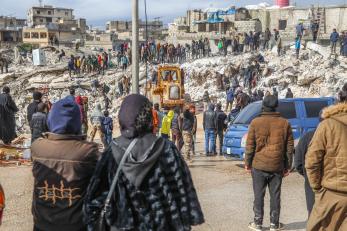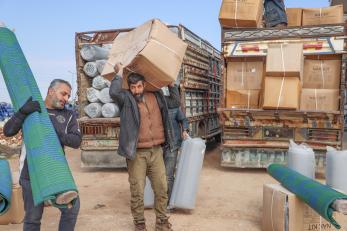There are 4 million people already in need in Northwest Syria
In the wake of the earthquake, Mercy Corps Syria Director shared critical needs on CNN

More than a week after the catastrophic 7.8 magnitude earthquake struck Northwest Syria and Turkey, the death toll has risen to more than 50,000 people. In Northwest Syria, at least 57 hospitals and primary health facilities are damaged or have had to suspend services, according to the United Nation. After 12 years of conflict, Syria had already been facing limited access to essential services.
“We have the manpower, we have the people on the ground, but what we need are resources,” said Kieren Barnes, Mercy Corps Syria Country Director. Only 5% of damaged sites in Syria were covered by search and rescue efforts. News reports indicate that rescue efforts have now ended in Northwest Syria due to limited resources.

The earthquake has affected nearly 11 million people across Syria, with 4 million in Northwest Syria relying on humanitarian aid for necessities like food and clean water. The quake has left at least 11,000 families homeless and displaced 30,000 people in Northwest Syria. In the aftermath of the earthquake, Mercy Corps has distributed 400 kits with essential items in addition to providing access to clean water.
Kieren recently appeared on CNN’s “Quest Means Business” to discuss the urgent needs across Northwest Syria in the wake of the earthquake disaster. From challenges in obtaining supplies to the lack of infrastructure for emergency response, Kieren spoke with CNN host Isa Soares on the critical support necessary for Syria’s long road to recovery.
Transcript of CNN’s “Quest Means Business,” with Mercy Corps Syria Country Director, Kieren Barnes
Isa Soares: Kieren Barnes is the Syria Country Director for Mercy Corps. He joins me now from Jordan. Thank you very much, Kieren, for taking the time to speak to us. We have seen, our viewers have seen here on the show some truly apocalyptic images. Just give us a sense of what you're hearing in terms of the scale of the devastation on the ground from your teams.
Kieren Barnes: Yes, thanks, Isa. It's an extremely difficult and complex situation in Northwest Syria, which is a very isolated and fragmented part of the country. We have struggled the last few days mostly with communications, but we have spoken to our teams on the ground and certainly, for many of them, have been affected by the earthquake.
Thankfully, all of them are safe, but a number of their families have been killed tragically in this. They have been out and about in the communities over the last couple of days and they have spoken about being with families, being with people who are standing next to rubble, hearing the voices of the relatives under that rubble, but simply not being able to do anything about it.
There isn't the infrastructure. There isn't the machinery or the expertise really, as we've seen in other parts of the region responding to the crisis. So it's truly desperate and truly dire and extremely tragic.
Isa: Yes, and of course, your focus is on the Idlib area, northwest. Correct? I think you said northwest of Syria.
Kieren: Yes.
Isa: I mean, it's a desperate situation, Kieren as you were saying, you know, that's only been made worse by these 12 years of civil war. Just talk to us about what teams do not have right now. I mean, equipment to clear rubble, you're talking there; the medicine, aid, shelter, any help of recovery, what is needed right now?
Kieren: Yes, so our teams, I mean, personally, they have been traumatised. So you're dealing with traumatised people trying to help everybody else. And thankfully, most of our team have come back together. But we have the manpower, we have the people on the ground, but what we need are resources. We are going to need a significant amount of resources over the coming days and weeks around shelter, as you say, the infrastructure particularly around water is concerning.
We provide water to 98 camps of people who are already displaced from the conflict. Some of those water sources have been contaminated because the infrastructure is broken, soil has leaked into that, so clean water is one thing.
We also have prepositioned kits that we've been giving out to people, things like mattresses, tents, jerrycans, blankets. However, there is only a finite amount of these things that we have prepositioned, we are going to need more in the coming days and weeks, and it is a concern about being able to access those in the long term.
Isa: And the main route from what I understand, into Syria that, of course, had been affected by the earthquake. In the last few hours, our team was able to confirm that now, that route is now open. In terms of getting aid in, when, how quickly, how soon, how much? Give us a sense of numbers here, Kieren?
Kieren: So I mean, there are four million people already in need in northwest Syria. I mean, it is an incredible amount of people for the last 12 years who have been desperate. This recent shock has put them in an even more dire situation than we can possibly even imagine.
So, you know, 4 million people who are heavily reliant on humanitarian aid on a daily basis, and now, we are responding to this shock as well. So those supply routes that do come through, we need them to stay open, we need the trucks to keep rolling, and that is not just with the U.N. or the humanitarian sector, we also need the commercial sector to be running as well.
We need to be able to go to vendors, to go to suppliers, buy the tents, buy the equipment so that we can start distributing more and more. So we need that channel to be functioning simply to respond.
We, as I said, work in 98 camps. We also need to reach out to about 136 communities on top of that. A lot of people are affected by the earthquake who are living in regular structures, apartment blocks, houses. They are the ones that have collapsed, and therefore, we are dealing with more displaced people than we ever have before.
Isa: More displaced, more people in need of shelters, like you said for 4.1 million people really going hungry and not just not in northwest Syria, but also because of, like you mentioned, food insecurity worsened by the war in Ukraine. Let me ask you this. We heard from the representative of Syria today to the U.N. who said that sanctions from the U.S. and EU on Syria are preventing airplanes and cargo full of aid and humanitarian assistance from reaching those who need it. What do you say to that? Are you seeing this?
Kieren: I mean, I think Syria has been a highly politicised conflict for the last 12 years and from—as humanitarian organisations, I think we just call on all parties to prioritise people above all else and make sure that we can access them in the best way and most effective way possible. I think that needs to be our priority and it applies to everybody. We need to put that first.
Isa: Indeed and Kieren, do keep us posted on how you get on. We wish you, of course, and your team all the best of luck. Appreciate it, Kieren. Kieren Barnes there.
Kieren: Thanks, Isa.
Isa: Well, for information on how to help earthquake survivors, go to cnn.com/impact. You'll find a list of organisations working on rescue and relief efforts. Again, that is cnn.com/impact. The details are all there for you.


